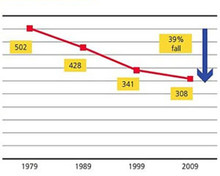
Led by Martin Moore, director of the Trust, the research for 'Shrinking World: the decline of international reporting in the British Press' involved counting the number of foreign news stories that appeared in a week in 1979, 1989, 1999 and 2009 in four UK national newspapers, the Guardian, the Telegraph, the Daily Mail, and the Mirror. The number of foreign stories on the front page, in the first 10 pages and in the whole paper were recorded and around 10,500 articles were involved in the research.
Across all four papers, the number of international news stories published in the week in question in 1979 was 502, compared with 308 in the week in 2009 - a 40 per cent fall in absolute terms. Despite growth in pagination of the titles since 1979, the number of international news stories as a proportion of each paper and the number of pages that they take up have both declined.
In 1979, international news stories made up around 20 per cent of a newspaper, the study suggests - a figure that has been in steady decline in succeeding decades, falling to 16 per cent in 1989, 13 per cent in 1999 and 11 per cent in 2009.
"You could argue that the decline in quantity and prominence of international news is symptomatic of a wider malaise in traditional news. Yet we live in a far more globalised world than in 1979, one in which our work, our social networks and our travel are vastly more international than they were," writes Moore in his introduction to the report.
"News outlets that have appealed to this internationalism - such as the Financial Times and the Economist - have increased their circulations. Why, then do other newspapers appear less interested in the outside world?"
The proportion of international news stories on the front pages of the four titles studied was at its highest in 1979 at 44 per cent, the report says, but this distribution of foreign reporting in the papers has not steadily declined up to the present day. In 1989 22 per cent of international news stories in the paper appeared on the front page, rising to 33 per cent in 1999 and declining slightly to 30 per cent in 2009.
"Almost a third of stories on the front page of these papers in 2009 were international (using a relatively generous definition of 'international'). This contrasts with the 11 per cent of the paper that is made up of international news. Therefore, going by the front page, one would think international news was still a big part of each newspaper," says the report.
Cuts to newsroom budgets forcing a reduction in foreign bureaux and correspondents are cited as a key reason behind the decline in foreign news in UK newspapers by the report.
But the study also looks at the decline in foreign news coverage after the end of the Cold War and suggests that this event provided a framework within which UK newspapers could report on international affairs. Despite the number of UK citizens living abroad and global economic and terrorism stories, these issues have not provided the same cohesive framework for British news reports of foreign affairs, it says.
The increase in access to non-newspaper news sources online and the advent of 24-hour rolling news channels may have contributed to the decline, the report suggests.
"The accessibility of information sources, particularly via the internet, has led to a gravitation of power to the centre of newsrooms. The more information the central news desk has (or believes it has), the less reliant those on the desk feel on the knowledge and expertise of the correspondent on the ground. By the time a newspaper's Washington correspondent has woken up, for example, there is a good chance the London desk will have sent them an email telling them which stories to follow up, having already read the New York Times, Washington Post and Wall Street Journal online. As the editors’ reliance flags, so does the power and status of the foreign correspondent," it says.
More to follow from Journalism.co.uk on the new research including interviews with Demotix's Turi Munthe, BBC foreign correspondent David Loyn and the Media Standards Trust's Martin Moore on why the decline in international news coverage by the British press matters.
Free daily newsletter
If you like our news and feature articles, you can sign up to receive our free daily (Mon-Fri) email newsletter (mobile friendly).
Related articles
- 'Don't force the readers to make assumptions'
- I am a public service journalist: what can AI do for me?
- Four journalists experiment with kid-friendly podcast to inform under-12s about the news
- German publishers are concerned the EU's ePrivacy Regulation is putting their digital advertising revenue at risk, study finds
- Report: UK newspapers engage readers far longer in print than online











